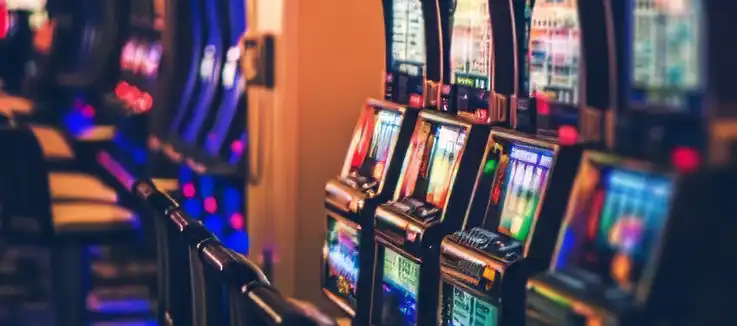High Tech Slots Scam Arrives in the US

When you login to our Sloto Cash Casino lobby, you know you're in a safe gaming environment clean of scams - player scams AND casino scams. But, land-based casinos have battled player scams for....well, forever!
Slot machine manufacturers have always had to be on the lookout for scams and cheats. From false coins, magnets and coins on a string to wires that trigger the payout mechanisms and collaborations with casino staffers, there has never been a shortage of attempts to manipulate slot machines.
Recently, a new scam was detected that involved using advanced technology to trigger extra payouts. Authorities identified the scam but not before the gang, which hit casinos around the U.S., made off with hundreds of thousands of dollars in ill-gotten cash.
Casino Scams
From the earliest days of the “one-armed bandit” there have been those who have tried to turn the slot machines’ technology against itself in order to activate illicit payouts.
There were simple cheats such as those involving casino employees who would pinch a few coins every time they emptied a slot machine’s coin collector. In the ‘60s and ‘70s cheaters tried to use magnets to influence the outcomes of the spins.
Other scams have been quite elaborate -- using a light wand to trip the machine’s electronic sensor and attaching a guitar string to a metal wand that could then be worked through an air vent to trip a microswitch that would then trigger a payout. Some scams involved acquiring insider information to discover a machine’s source code and determine results of the Random Number Generator.
Just when slot machine designers had begun to relax and believe that they had created machines that could not be penetrated, a new scam was uncovered. The so-called Russian Slot Machine scam originated in the Former Soviet Union and netted the gang hundreds of thousands of dollars during the 2nd decade of the 21st century.
As far as authorities know, the scam is still working.
Russian Slot Machine Scam
The Russian scam was first detected in June 2014 when accountants at St. Louis’s Lumiere Place Casino noticed that several of their slot machines were not performing according to specifications regarding the mathematical edge that the house was supposed to enjoy. The machines were, in fact, paying out more money than they’d taken in and the “negative hold” indicated that there was cheating going on.
Casino security viewed surveillance tapes and quickly identified the culprit, a young man who played machines manufactured by Aristocrat Leisure of Australia. The one thing that the security team noticed was that the man pushed buttons while he held his iPhone close to the screen. The man would consistently walk away after a few minutes but would always return to the same machine and that’s when he’s get lucky, winning payouts of up to 20x his bet.
Lumiere Place shared its findings with the Missouri Gaming Commission and the Commission issued a statewide alert. That led to other state casinos discovering that they had experienced similar losses in similar circumstances. Different men were involved but in all cases, the suspect held a cell phone close to an Aristocrat Mark VI model slot machine which then became generous.
Rental car records showed that the Lumiere Place scammer was Murat Bliev, a Russian national who had returned to Moscow shortly after playing at the casino. Investigators determined that Bliev worked for a St. Petersburg–based crime syndicate which employs dozens of operatives to manipulate slot machines around the world. When Bliev returned to the United States to keep “working” he was arrested. Authorities believe that his gang cracked Aristocrat’s algorithms which allowed them to run their scams.
Russia
Gambling has been outlawed in Russia since 2009. When the ban was placed casinos were forced to sell their slot machines. Counterfeiters bought the discarded machines at discounted prices with the goal of learning how to probe the machines’ source code for vulnerabilities. The first machines to have their codes broken were those made by Novomatic.
Investigators determined that the cheaters had figured out a way to predict the slots’ behavior. Novomatic wrote to its customers in February 2011 that “through targeted and prolonged observation of the individual game sequences as well as possibly recording individual games, it might be possible to allegedly identify a kind of ‘pattern’ in the game results.”
In essence, the cheaters had figured out how to predict the results of pseudorandom number generators which produce random slot machine results by design. The numbers, however, aren’t really random (as the “pseudo” in the name suggests), Humans create them using coded instructions.
In this case, the hackers successfully identified the mathematical codes that powered the PRNGs. That knowledge gave them access to the secret arithmetic that a slot machine uses to create pseudorandom results. Then the hackers analyzed the machine’s gameplay in order discern its pattern. The fact that the hackers had access to the old Russian machines made it possible for them to accomplish this reverse engineering.
Sting
A casino security expert named Darrin Hoke from the L’Auberge du Lac Casino Resort in Lake Charles, Louisiana identified 25 alleged operatives who'd been plying their scam in casinos from Romania to California to Macau. When one of the operatives was arrested and his cell phone was confiscated, investigators were able to determine that the phone was used to record a few dozen spins on a machine that they planned to cheat.
The footage would be uploaded to a technical staff in St. Petersburg who could analyze the video and, based on what they already knew about the model’s pseudorandom number generator, calculate the machine’s pattern. The St. Petersburg team would then transmit a list of timing markers to a custom app on the operative’s phone. The markers made the handset vibrate and after 0.25 seconds the operative would press the spin button.
One of the investigators explained that “the normal reaction time for a human is about a quarter of a second, which is why they do that…..the timed spins are not always successful, but they result in far more payouts than a machine normally awards. Each scammer could typically win more than $10,000 per day.
The operatives would keep their winnings to less than $1,000 per machine to avoid arousing suspicion.
Return
Bliev returned to the United States and was arrested in St. Louis at the Hollywood Casino. Since the scam was committed across state lines, he and his compatriots faced fraud charges on a federal level. Bliev, together with three cohorts, accepted plea bargains and are scheduled to be deported after serving 2 year sentences in federal prison.
However, the St. Petersburg organization continues to operate. They have new tricks which include the ability to record using a cell phone hidden in the operative’s shirt chest pocket that’s located behind a little piece of mesh. There is also suspicion that videos are being streamed back to St. Petersburg via Skype to eliminate the need to step away from a slot machine to upload footage.
Casinos in Peru and Singapore have also caught scammers from this organization and since there is no easy fix for the machines, the scammers will most likely continue to operate. Right now, the only solution would be for companies to pull all machines out of service where the PRNG has been cracked, though game developers are working hard on better PRNG encryption techniques.












